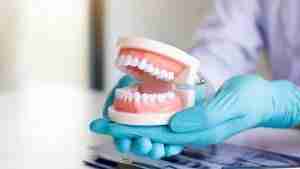What Are Full Denture with Implants?
Implants and dentures are the most effective methods that dentists use today to solve the absence of teeth. Full denture implant treatment is a dental procedure that involves the insertion of titanium posts into the jawbone to replace one or more missing teeth. The posts fuse with the jawbone and the doctor places an artificial cap on top. This type of implant treatment is particularly popular because it offers greater stability and durability than traditional dentures. There are three types of full denture implants: single-post, dual-post, and multiaxial. All-on implants use four or six dental implants in each arch to replace all of the teeth in a patient’s mouth. The cost of treatment varies depending on the type of procedure used, but full denture implants are more expensive than traditional dental implants. Proper care should be taken to prevent decay and wear, as these implants can last a lifetime when taken care of properly.
What’s the Difference Between Implant Dentures and Removable Dentures?
When we talk about removable prostheses we refer to the dentures we have always had. Although they seem like an old-fashioned solution, the truth is that they have evolved over time and are a suitable option for some patients. On the other hand, implants are one of the most advanced methods for dental replacement treatments. An implant is surgically placed in the jaw bone and an artificial ceramic or zirconium tooth is screwed to it.
What are the Benefits of Full Denture Implant Treatments?

- Improved functionality and stability of dentures
The benefits of improved functionality and stability of dentures are numerous. Dentures with implants provide greater stability and improved functionality, making them more comfortable and increase their longevity over traditional dentures. Implant dentures are a permanent solution that helps to preserve the structural integrity of the jaw. Additionally, these improved dentures may lead to an improvement in speech ability while reducing the need for regular replacement due to poor fitting. Cost savings can also be realized since implant-supported denture treatments are often more cost effective than getting individual implants throughout the mouth.
- Improved chewing ability and taste sensation
Full denture implant treatment provides patients with improved chewing ability and taste sensation, which are both major advantages of the treatment. This is due to the secure and comfortable fit it offers, as well as its ability to virtually eliminate bone loss. As a result of this improved fit, patients can eat more types of foods and gain greater confidence in their dentures.
- Improved aesthetics and facial features
Full denture implants can improve a person’s facial appearance and self-esteem by restoring the natural look and feel of having teeth. They also provide more bite function than standard dentures, which can allow a person to enjoy eating food without facing difficulties. Additionally, full denture implants have a high success rate of 98 percent and can last for many years or even decades with proper care.
- Reduced need for denture adhesives
Full denture implant treatment eliminates the need for denture adhesives, which is a benefit. Implants snap on and off instead of relying on adhesive materials to keep them in place. This makes it easier to keep teeth securely attached and eliminates the need for messy or difficult-to-apply adhesives.
Considerations for Removable vs. Dentures with Implants
When opting for traditional dentures vs dentures with implants, here are a few things to keep in mind:
- Removable Dentures often have to be held in the mouth through the use of adhesives. This sometimes requires having to reattach the denture after meals. An implant-supported denture does not require adhesive.
- Removable Dentures cover the roof of the mouth interfering with the sense of taste. Dentures with implants however, nothing covers the roof of the mouth.
- Dentures may slip when eating or speaking. Implants and implant-supported dentures are securely anchored and do not slip.
- It is difficult to chew with traditional dentures and you cannot eat many of the foods you like best. Dentures can move while you chew, which is annoying. In fact, dentures generally only have 10% or less of full chewing power. On the other hand, dental implant supported dentures have full chewing power.
- Dentures can make a snap. With implants or implant-supported dentures, there is no clicking.
- Implants ensure that jaw bone is not lost. The jawbone needs to have the necessary stimulation to prevent bone loss.
Who ‘s a Candidate for Dentures vs Implant Dentures?

If you are missing one or more teeth, or have broken or damaged teeth that are irreparable, dentures and implants are often the solutions available. If you are not comfortable with dentures, partial dentures or bridgework, you may want to consider dentures with implants.
In the past, patients with bone insufficiency or who had certain health conditions or habits were not considered candidates for implants. Advances in diagnostics and bone reconstruction have made it possible for most patients to receive implants.
BENEFITS AND ADVANTAGES OF DENTAL IMPLANTS
Dental implants resemble natural teeth.
Implants restore full chewing power. There is almost no difference between natural teeth and implant dentures. Patients can eat normally, brush and floss their teeth.
Dental implants can last a lifetime
The implant is made of titanium and integrates with the jawbone. It is biocompatible, which means it is non-toxic and is not rejected by the body. In short, it is a powerful replacement tooth.
Dental implants prevent bone loss
The jaw bone needs stimulation to grow naturally. When there are no teeth, the jaw bone deteriorates. An implant replaces both the root and the tooth and this provides the necessary stimulation for natural bone growth.
Dental implants can prevent facial sagging and premature aging
Facial sagging can be an unwanted effect of bone loss as a result of missing teeth. Changes may include excessive wrinkling around the mouth, thinning of the lips and a more pointed chin, making the person look much older than their true age.
What is the Cost of Dentures implants?
The cost of removable dentures and the cost of implant dentures are quite different.
The price will depend on different factors. First, the material used. Porcelain dentures will always be more expensive than acrylic ones. The price will also vary if the dentures needed are full or partial and if you need prior treatment, such as any tooth extraction.
Implant dentures, on the other hand, are quite more expensive than conventional dentures. This difference in price is due to the longer process involved and, of course, the materials used.
After some time, conventional dentures will need to be repaired or adjusted. If they are not repaired, you will not be able to eat properly. The cost of new conventional dentures, or their repair, can in many occasions exceed the price you would pay for implant dentures.
What is true, is that dentures in general are not cheap. If you have dental insurance, pay attention to the coverage. Generally, the dental insurance should cover at least a small percentage of the full amount.
Dentures Implants Procedure

The fitting process of dentures and implant dentures varies significantly. While having dentures ready for use is a quite short process, implant dentures take a long time before they are fixed in your mouth. The denture development process takes some weeks and several visits to your prosthodontist.
Steps to Follow:
For Removable Dentures
- An initial comprehensive exam to check the overall conditions of your mouth.
- Your prosthodontist will make some impressions of your jaw.
- Models will be created to try in as many times as needed.
- Finally, the lab will cast a final denture.
- Adjustments will be made before the patient goes home with a new set of teeth.
For Implant Dentures
Procedures may last from three to six months, depending on each case, and many visits to your prosthodontist.
- An initial comprehensive exam to check the overall conditions of your mouth.
- X-rays or CT Scan will be involved if needed
- Bone grafting in cases when there is not enough bone mass and it is possible that the implants will not attach properly.
- Implant placement
- Affix of temporary dentures for around three months until the jawbone is healed.
- Attachment of permanent implant dentures.
How Do I Take Care of Dentures and Implants?
Dentures and implant dentures also vary in the way you should take care of them. While dentures need specific care, you can treat implant dentures as natural teeth. Let’s read about this.
Tips to take care of your dentures:
- Dentures need daily cleaning to avoid stains. Brush them carefully and rinse them after every meal.
- You need to use dental cleaner to clean your dentures. Do not use toothpaste nor bleach.
- Leave them inside a denture cleanser solution when you don’t use them. This will prevent the dentures from drying and breaking.
Tips to take care of your implant dentures:
- You must clean the implant properly, as well as the rest of the teeth, at least 3 times a day, after each meal.
- To do this, we recommend using the usual toothbrush, dental floss and mouthwashes.
- Dental hygiene must be a priority. The accumulation of bacteria around the implant can lead to peri-implant pathologies. Thus, poor dental hygiene can result in having to remove the implant.
If you are considering any of these dental techniques, do not hesitate to consult Ocean Breeze. Our professionals will guide you in your decision and will assist you in the dental process. Contact us!
